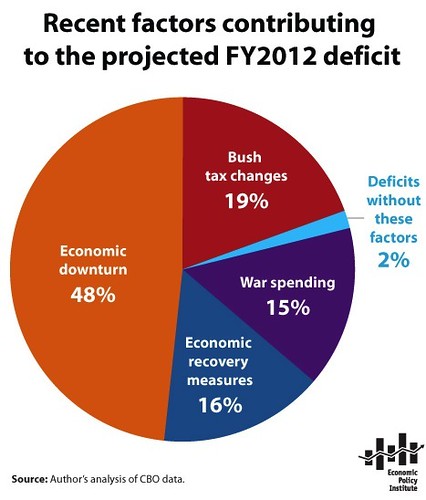NY-26 Lesson: Don’t Mess With Medicare — Or Social Security!
In 2010 Republicans and corporate front groups ran ad after ad after ad after ad claiming that Democrats had “Cut 500 billion from Medicare.” Those ads brought them the senior vote, and they took the House. Confident in their ability to “create their own reality” they came out with a plan to privatize Medicare and told the public it would save Medicare. Well, last night’s win by Kathy Hochul in the NY-26 special election — with pretty high turnout in a Republican district — shows that the American people are smarter than they look, and figured out what was what. The lesson: don’t mess with Medicare.
Soundly Defeated
Yesterday’s NY-26 Congressional election turned on Medicare and the candidate who supported Medicare won. The candidate who supported the Republican plan to privatize Medicare was soundly defeated.
House Republicans voted to change Medicare from a single-payer plan to a private-insurance voucher plan as a measure to “cut government spending.” Republicans had talked themselves into believing the public hates government as much as they do and therefore gutting it is what the public wants. Instead of working to control health care costs they just shifted those costs away from the government into “personal responsibility” land. In plain non-propagandized English personal responsibility means each of us on our own, alone, instead of all of us watching out for and taking care of each other.
The public figured it out and voted to keep the Medicare-gutter out.
American Majority
The American Majority understands what is going on. They know that our budget problems come from tax cuts, military spending and the lack of jobs. Those are the things the public wants the Congress to fix.
Where the deficits come from:

Gallup Poll, January 14-16, 2011
- 64% oppose spending cuts to Medicare.
The Wall Street Journal/NBC News Poll, February 24-28, 2011
- 54% believe it will not be necessary to cut spending on Medicare to reduce the national deficit.
- 76% believe cutting Medicare to help reduce the budget deficit is mostly or totally unacceptable.
- 60% oppose turning the Medicare system into a government-issued voucher program, which would require the beneficiary to purchase private health insurance.
First Focus and Greenberg Quinlan Rosner Research Poll, April 13-18, 2011
- 70% oppose cuts/changes to the Medicare system as described in the House Republican Budget.
- 49% support not reducing funds to Medicare.
- 53% believe replacing the current Medicare program with a voucher system in which retirees will receive vouchers to use to purchase subsidized insurance from private insurance companies for those 55 or older is totally or mostly unacceptable.
CBS News/The New York Times Poll, April 15-20, 2011
- 61% believe that Medicare is currently “worth the costs.”
- 76% think government has the responsibility to provide health care coverage to the elderly.
- 49% believe higher-income beneficiaries should pay more in taxes.
Bloomberg News Poll, March 4-7, 2011
- 54% oppose replacing Medicare with a system in which government vouchers would help participants pay for their own health insurance.
- 76% oppose reducing benefits for Medicare.
Pulse Opinion Research for The Hill Poll, April 28, 2011
- 53% said they would oppose a reduction in Medicare benefits in order to get the deficit/debt under control.
Pew Research Poll, March 8-14, 2011
- 65% oppose changes to Social Security as a way to reduce the budget deficit.
More recent polling shows the public has moved to an even strong support for Medicare, and will remove from office anyone who votes to cut it.
Social Security The Same
Those polls don’t just test public support for Medicare, they test support for Social Security as well. The public feels just as strongly that politicians had best keep their hands off our Social Security.
In order to reduce the national debt, would you support or oppose cutting spending on Social Security, which is the retirement program for the elderly?
Ohio: 16% support, 80% oppose
Missouri: 17% support, 76% oppose
Montana: 20% support, 76% oppose
Minnesota: 23% support, 72% oppose
Reality Restored
During the Bush years the idea of a “reality-based community” circulated after an article by Ron Suskind about a meeting he had with “a senior advisor to Bush.” In the article he described how the aide scoffed at people who bother with reality:
The aide said that guys like me were “in what we call the reality-based community,” which he defined as people who “believe that solutions emerge from your judicious study of discernible reality.” … “That’s not the way the world really works anymore,” he continued. “We’re an empire now, and when we act, we create our own reality. And while you’re studying that reality—judiciously, as you will—we’ll act again, creating other new realities, which you can study too, and that’s how things will sort out. We’re history’s actors…and you, all of you, will be left to just study what we do.”
Republicans and their corporate money tried to create a reality that let them gut Medicare without the public rising up to do something about it. It didn’t work.
Do The Right Thing
Well, reality is coming back. The public is figuring things out. Politicians should learn the lesson of NY-26: don’t mess with Medicare — or Social Security. To fix the deficit fix the causes of the deficit: invest in jobs through maintaining and modernizing our infrastructure, restore top tax rates to where they were before we had huge deficits and, by the way, the Soviet Union is long gone so cut military spending back to maybe only twice our nearest potential competitor.
This post originally appeared at Campaign for America’s Future (CAF) at their Blog for OurFuture. I am a Fellow with CAF.

Dave Johnson
Dave Johnson (Redwood City, CA) is a Fellow at Campaign for America's Future, writing about American manufacturing, trade and economic/industrial policy. He is also a Senior Fellow with Renew California. Dave has more than 20 years of technology industry experience including positions as CEO and VP of marketing. His earlier career included technical positions, including video game design at Atari and Imagic. And he was a pioneer in design and development of productivity and educational applications of personal computers. More recently he helped co-found a company developing desktop systems to validate carbon trading in the US.
Recent Comments
- Kucuka.net on Intellectual Property is a bad thing.
- evgeniy levchenko datums aangemeld on Debt slavery is a natural consequence of unregulated capitalism
- best career counselor on What will it take to address the climate emergency
- hyip on Debt slavery is a natural consequence of unregulated capitalism
- Tony Williams on Debt slavery is a natural consequence of unregulated capitalism
Blogroll
- 4dancers
- Aaron Krager
- Amygdala
- Autonomy for All
- Away Point
- Blue Jersey
- Bluemars
- Brad Blog
- Campaign for America's Future
- Cassandra Files
- Clear It with Sidney
- Cogitamus
- Crooks and Liars
- Cucking Stool
- Daily Show with Jon Stewart
- Dirty Hippie Sports Talk
- Disaffected and It Feels So Good
- Dispatches from the Culture Wars
- Dork with a Nerd Rising
- Eastern Sunz
- Florida Progressive Coalition
- Focal Points
- FOK News Channel
- Frederick Clarkson
- Frustrated Teacher
- Greatscat!
- HandPicked Nation
- Jazz from Hell
- jazz89 KUVO Public Radio
- Kenneth J. Bernstein
- La Bloga
- Lee Camp
- Litbrit
- Live Free or Die Alliance
- Live from the Left Coast
- MarioWire
- Media Matters
- Merge Left
- Mind Potion Radio
- MPA Political
- New York Communities for Change
- Nuclear Diner
- Political Carnival
- Progressive Leadership Action Network
- Progressive PST
- Radio or Not
- Republic Report
- Scholar as Citizen
- Scholars and Rogues
- Seeing the Forest
- Smirking Chimp
- Smoking Politics
- SomaFM
- Somos Tejanos
- Speak Out California
- Spedwybabs
- Spocko's Brain
- Stark Reports
- StarTalk
- Suburban Guerilla
- Symphony of Science
- Talk to Action
- thereisnospoon
- Today's Workplace
- Truth Vigilante
- Waking from the American Dream
- Worldwide Hippies
- WTF Is It Now?!?
- Error: Could not open handle for fopen() to http://heyhippies.tumblr.com/api/read?num=2
Category Cloud
Activism Americans Barack Obama Blogging Budget Bush II Administration Business Capitalism Class Warfare Congress Conservatives Corporatism Corruption Democracy Democrats Dirty Hippies Economy Education Elections Extremism Government Greed Health Care Jobs Journalism labor Media messaging Obama Administration Politics Progressives Religious Right Reproductive Rights Republicans Satire Social Security Taxation Tea Party Uncategorized Unions US Politics Violence Wall Street Wealth Wisconsin



